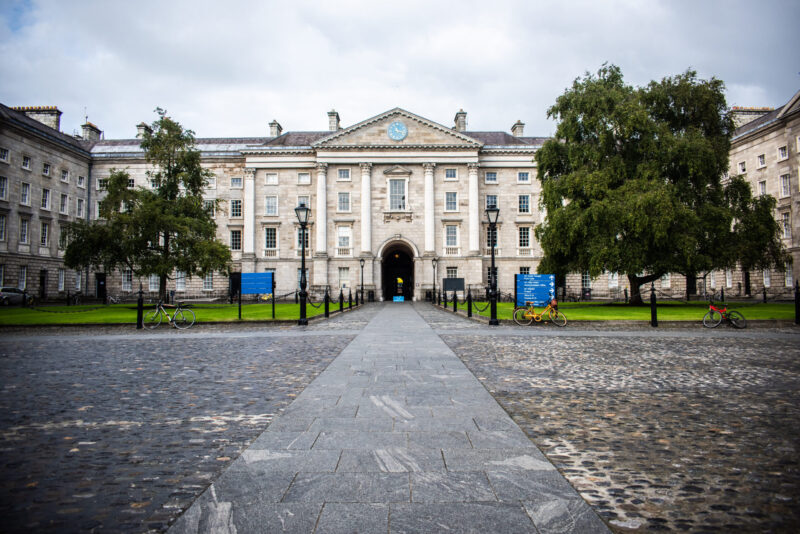Some of my lectures in the first two years were in a lecture hall with no designated wheelchair spot. I sat in the aisle beside the door because the steps prevented me from sitting with the rest of my classmates. On more than one occasion I have turned up to the Arts Block for an early morning class only to be told the lift isn’t working and I should just go back home until it gets fixed.
These are small examples of the inaccessibility I have faced in Trinity but good examples of how it made me feel: excluded. My time in Trinity is coming to an end. It’s bittersweet; I’m thankful for having had the experiences my time in college has given me, but I’m eager to move on – I’m fed up with spending my time in an environment that is inaccessible for students with disabilities.
I’m always struck by the fact that the pathway through the cobbles in Front Square was constructed just over a decade ago. I have no idea how students who used wheelchairs traversed Front Square each day to go to their classes before this. Since then, small changes like the addition of a Changing Places bathroom in the Arts Block have improved accessibility, but, overall, Trinity remains somewhat inaccessible despite the great efforts of the Disability Service and student advocates.
College remains inaccessible to students with disabilities because the people with the power and money to make the necessary changes don’t care enough. Online learning was sought after by students with disabilities for the past decade but was only implemented last year after the sudden onset of the coronavirus pandemic because it was needed by all students. Online learning shouldn’t be cast aside and forgotten when the pandemic ends. It needs to be improved and continued to ensure more access to education. Inaccessibility isn’t exclusive to Trinity – it is spread throughout the education system.
These are small examples of the inaccessibility I have faced in Trinity but good examples of how it made me fee: excluded
Year upon year, more students are earning the opportunity to study higher level education thanks to supportive programmes like the Disability Access Route to Education (DARE). Figures published by AHEAD of the 2018/19 academic year show that 6.2 per cent of students identify as having a disability, and that this figure has risen by 200 per cent in just the past 10 years. The Disability Service reported that there were 1,777 students with disabilities registered with them during the 2019/20 academic year, so it is important now more than ever for the college to become completely accessible.
Accessibility can mean many different things. Access for students with physical disabilities and students with learning difficulties require vastly different things. People’s attitudes and biases against people with disabilities are often what make the world inaccessible. The reality is that the majority of people just are not aware of disability issues. They’re just ignorant, not malicious. Changing attitudes is a difficult task. It is definitely not something that can be done overnight. Ableism is ingrained in us from a young age. Myself included.
On more occasions than I care to remember, I’ve encountered people who think that DARE students don’t belong in Trinity. Hearing this professed at a drinks reception hosted by one of the debating societies, I tried not to cry, continued sipping my wine and I remember having never felt so small and insignificant. I earned my education just as much as any other student. If anything, having a disability made me work harder, determined to prove myself. This is a common mindset amongst students with disabilities.
Accessibility can mean many different things. Access for students with physical disabilities and students with learning difficulties require vastly different things
I’ve seen students’ union teams come and go, some not even making an effort to deal with disability issues. I was reluctant to get involved with student politics because they were based in House Six – a building that is inaccessible to me and other students with physical disabilities because of the stairs. To me, this translated as “we don’t want you – stay out”, and so I did. It wasn’t until this year that I decided to have my voice heard and get involved with the Trinity College Dublin Students’ Union (TCDSU) as the officer for students with disabilities. Learning to advocate for oneself is an essential skill for students with disabilities.
As negative as I sound, I must admit that I am hopeful. The incoming team of TCDSU officers and new provost all seem to be aware of the problems Trinity poses to students with disabilities and are committed to removing access barriers. One of the things I value most about my experience in Trinity is the amazing group of disability activists and advocates I have met. I’m comforted by the fact that these people will carry on the fight for accessibility long after I’ve gone. I don’t want to be one of those people who can’t seem to leave their college years behind them but I can’t promise that I won’t check in with Trinity and the progress that they’re making with accessibility in years to come.
Until every single aspect of Trinity and the education that the university provides becomes totally accessible, the label of inaccessibility will cover the whole college
Niamh Ní Hoireabhaird is the Trinity College Dublin Students’ Union Officer for Students with Disabilities.







